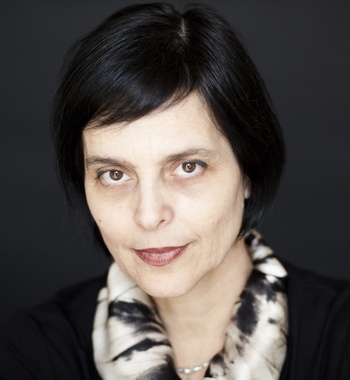Dal Niente showcases Israeli composer’s eruptive music

Evanston was the place to be for contemporary music fans over the weekend.
While Northwestern University’s John Cage Festival perked along with concerts and a symposium, Ensemble Dal Niente drew a large, youthful crowd for a demanding concert Friday night a few blocks south of campus. Performed in the Music Institute of Chicago’s Nichols Hall, their program focused on Chaya Czernowin, an Israeli-born composer now based at Harvard University.
The music of Cage and Czernowin is not for the faint of heart. Cage’s pieces are often full of disorienting silences and outbursts, but there are also moments of radiant beauty–the glow of a single, resonant tone or a snatch of melting harmony.
The Czernowin pieces that Dal Niente chose for their concert Friday night offered less respite for the ear. The ensemble performed her The Last Leaf in its world premiere, Afatsim (1996), Winter Songs II: Stones (2003) and Sahaf (2008). The program also included Jargon of Nothingness (live version 2012) by American composer Steven Kazuo Takasugi and Anton Webern’s masterpiece from 1910, Four Pieces for violin and piano.
In remarks during the concert, Czernowin said she didn’t expect listeners to understand her music at first hearing. She hoped, instead, to create moments of sound and silence that would linger in their ears and prompt further thought about the complete piece.
On that basis, Dal Niente’s crisp, committed performances achieved her goal. The ensemble is one of Chicago’s most daring new music groups, and Dal Niente’s players are fearsomely talented. They brought both prodigious technique and high drama to Czernowin’s music, which ranged from a crackling solo for sopranino saxophone (The Last Leaf) to a wild, raw-edged mash-up for large ensemble (Afatsim).
Czernowin’s pieces for larger ensemble—Afatsim and Winter Songs II: Stones, both conducted by Michael Lewanski–showcased everything Dal Niente has to offer. The title of Afatsim refers to growths that emerge on plants attacked by parasites, and a sense of waxing and waning violence permeated the 15-minute work. The opening moments were subdued, but the instruments muttered and stirred like a gang preparing to attack. In a flash, we heard agonizing cries–raspy strings here, bleating winds there, the demanding crash of a piano, the hard, dry slap of a cymbal. At one point, the instruments came together, cracking and groaning like a building falling to bits. The tension between relative quiet moments and cacophony compelled our attention.
Winter Songs was less violent, though still highly colored. At times the bass flute floated like a seagull above the rustling ensemble. The sound of rattling stones in the percussion was both soothing and unsettling. We had a sense of heavy seas as the sound heaved and swayed. But in the final moment, as a breathy, single note from the tuba faded into silence, serenity reigned.
Czernowin’s mood was lighter in Sahaf (Drift) for saxophone, electric guitar, piano and percussion. Evoking the dry tick of a spinning roulette wheel, the ratchet rattle drove this high-spirited, sometimes raucous little piece. In The Last Leaf for solo sopranino sax, Ryan Muncy expertly ranged from twittering bird calls to full-bodied exclamations.
Jargon of Nothingness by Takasugi, a colleague of Czernowin’s at Harvard, was a strictly choreographed study for electronics and two live performers. Clarinetist Alejando T. Acierto and oboist Andrew Nogal moved like robots, picking up, playing and putting down their instruments with precise deliberation. As the music swelled and faded, the difference between live sound (if indeed there was any) and crackling, sometimes thunderous electronics was impossible to discern.
Amid the evening’s jagged edges and jarring twists, Webern’s crystalline, delicate Four Pieces, performed by pianist Winston Choi and violinist MingHuan Xu, sounded positively romantic.
Posted in Uncategorized




